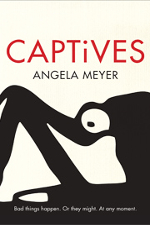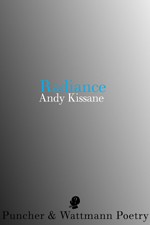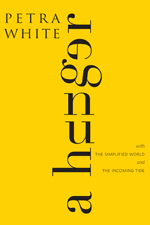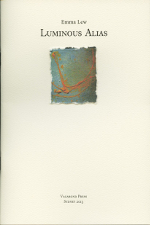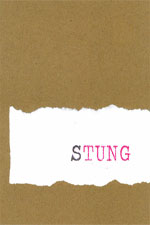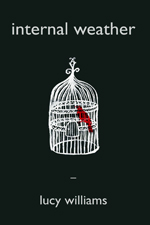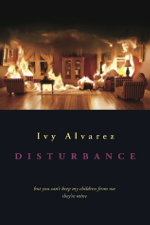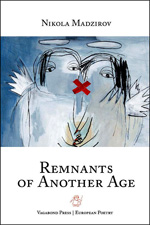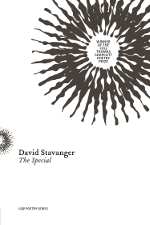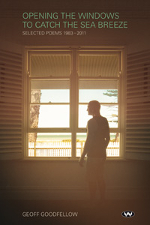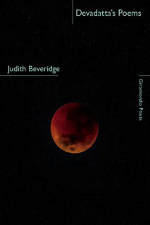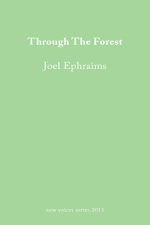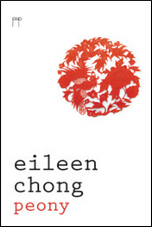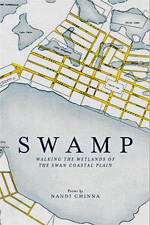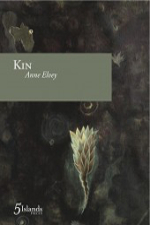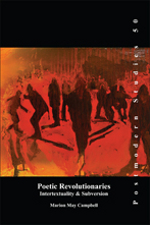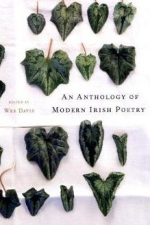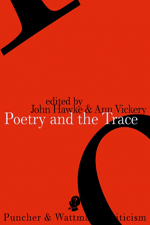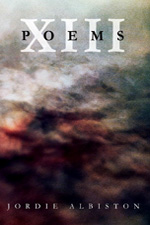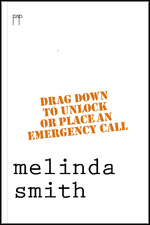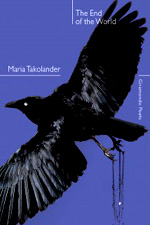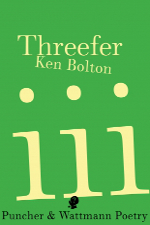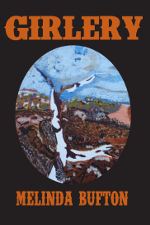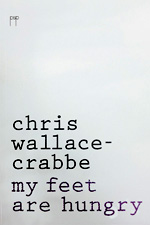BOOK REVIEWS
Review Short: Angela Meyer’s Captives
Fittingly tiny by way of physical size, Captives is a beautifully produced collection of micro-fiction by the Melbourne author and critic Angela Meyer (known also as the blog writer, Literary Minded). While in a poetry-dedicated journal such as Cordite Poetry Review, it may seem odd to be reviewing a book that makes no explicit claims to being poetry – or, more specifically, the difficult-to-define mode of prose poetry – Meyer’s micro-fictions do seem to invite comparisons with contemporary prose poetry.
Review Short: Andy Kissane’s Radiance
In ‘Percy Shelley’s Heart’, Kissane writes with gusto and surreal humour. But he is equally at home portraying domestic intimacies within the poet’s own relationship (‘Sea of Tranquillity’), or hardship and joy as a child plays soccer with his friends following a day scrounging a living in Phnom Penh’s garbage tip (‘On Smoky Mountain’).
Martin Duwell Reviews Petra White
Petra White’s A Hunger is a kind of Collected-Poems-so-far, containing her two previous books, The Incoming Tide and The Simplified World, and a new collection that provides the overall title. It is not a large body of work but it is an impressively consistent one and a third book is often a good place from which to get a grip on a poet’s overall orientations.
Gig Ryan Reviews Emma Lew, Bella Li, Kate Lilley, and Jennifer Maiden
Elegy intensifies around the objects that remain, those keepsakes that must signify a spent life. In Kate Lilley’s Realia, the first poem ‘GG’ is an auction listing from Greta Garbo’s estate in which the repetition of Garbo’s name intones like a docked requiem. Only things exist timeless, immutable, saleable, as shining representatives of the once-living. Life’s fraught event is reduced to its acquisitions, and transformed, satirised, into capitalism’s ultimate wearer of labels: the former consumer of commodities is now more amenably cast purely as a selection of those objects, whose value her absence increases.
Review Short: Chris Mansell’s STUNG
Chris Mansell is a widely published poet with a lively range of interests, a multi-talented writer who bridges various creative worlds; her work sometimes fusing with music, the visual arts, and theatre. Her departure from a narrow specialisation in poetry is highly admirable, but may have made her somewhat under-appreciated both as an energetic innovator and important poet of her generation. Mansell’s first book of poetry appeared in 1978, and she has published more than 25 books and chapbooks in the intervening decades; while her Schadenvale Road, a collection of short stories, appeared in 2011.
Review Short: Lucy Williams’s Internal Weather
While Lucy Williams’s Internal Weather is split into the unavoidable cycle of life – birth, childhood, and death – the collection as a whole is a love song, a tribute to ‘difficult events’ and ‘unattended shadows’. The poems emphasise how the ‘forming of words’ and the ‘making of stories’ locates these instances in specific moments of memory and time. Indeed, love is the lung-set of Internal Weather: love for a child, first love, romantic love, love lost, love for the dead, love that ‘surprises … like religion’ and thickens ‘doubt into determination’.
Andy Jackson Reviews Ivy Alvarez and Janet Galbraith
How do we truly belong here on this continent, come to terms with our collective and personal history and build a genuine home for the future? And what of the ongoing legacy of violence on an intimate scale, by men against their partners and children – how can this be challenged and interrupted, changed into mutual trust? These are crucial questions; complicated and painful, yet unavoidable. Two new books recognise this and respond with what, to me, are poetry’s great strengths: the generation of an empathic interpersonal encounter, and that aching paradoxical space of both knowledge and productive ignorance.
Adam Aitken Reviews Nicola Madzirov and Jan-Willem Anker
I am holidaying in a small farming hamlet in the south of France. I have brought two books of poetry written by contemporary Europeans and republished in handsome Vagabond Press European Series editions. A Sydneysider most of my life, I’ve been coming to France regularly since the mid-1990s, accompanied by my wife who’s English and whose parents live in the region. I’m enjoying my dose of the old world, but thinking, what is home? And what is home to me and to these farmers? More precisely, what is it about Europe today that we value?
Review Short: David Stavanger’s The Special
David Stavanger won the 2013 Thomas Shapcott Poetry Prize. The resulting book, The Special, is his first full-length collection of poetry, and is dedicated to ‘the dead/ who are bravely living/ (and to those who wake wild-eyed in the dark)‘, a salute to people who suffer the acute distress of mental illness.
Review Short: Geoff Goodfellow’s Opening the Windows to Catch the Sea Breeze
Geoff Goodfellow has been a ‘people’s poet’ for thirty years. The qualifications he brings to the role seem simple enough, if a little generic: a rugged working class upbringing; a simple style and language that anyone can understand and relate to; time spent working with, and reading to, workers, prisoners, the unemployed.
Emily Bitto Reviews Judith Beveridge
In her 1996 collection, Accidental Grace, Judith Beveridge published a series of six poems entitled ‘The Buddha Cycle’. The poems in ‘The Buddha Cycle’ are each spoken by individuals, predominantly low in the caste system, who look to the Buddha for some hope or guidance. This marked the beginning of what has be-come, for Beveridge, an enduring interest in the Buddha and Buddhist history, a subject she has approached from a number of shifting perspectives.
Review Short: Ainslee Meredith’s Pinetorch and Joel Ephraims’s Through the Forest
The two latest chapbooks in Australian Poetry’s new voices series are remarkable because they occupy two very different kinds of poetic practice to equally interesting and impressive ends. Both are playful, and push against the boundaries of form, with a crisp lyric impulse at play in Meredith’s work and an almost psychedelic sensibility animating Ephraims’s collection.
Kim Cheng Boey Reviews Eileen Chong
In a suite of three poems praising the legendary beauty, Consort Yang Guifei, the Tang poet Li Bai draws on the virtues of the peony, a flower that with its luxuriant petals and luminous colours embodies feminine beauty and allure.
Review Short: Nandi Chinna’s Swamp: Walking the Wetlands of the Swan Coastal Plain
To introduce Nandi Chinna’s Swamp the reader is presented with the idea of poetic creation through walking. Chinna describes how ‘the legs move through time and space, marking the movement over grass, stones, hills, and through wind’ (8). Indeed many of her poems in this collection engage with just this sense of time, space, and movement as walking becomes a way for Chinna to trace the wetlands of the Swan Coastal Plain, those that have been lost, and those that are fragmentary.
Cassandra Atherton Reviews Anne Elvey
The kinship Elvey forges between her poems and ecological criticism lends both rigour and reverence to her first full-length collection of poetry. There is a radiant stasis at the core of her poems that encourages the reader to listen to the susurration of multiple, overlapping conversations to which Elvey is contributing.
John Kendall Hawkins Reviews Poetic Revolutionaries: Intertextuality and Subversion
As I read Marion May Campbell’s new book, Poetic Revolutionaries: Intertextuality and Subversion, I was reminded of the still seemingly sacred notion of a democratic historical progress. This notion celebrates cultural alterity (and all that that implies), and makes an urgent appeal to textual revolution as a means to political resistance. Campbell’s work is rooted in the relativist revolution – the book is part of publisher Rodopi’s Postmodern Series – and her intense, erudite study addresses a state of disunion that has loosely bound the dwindling body of progressives ever since.
Aaron Mannion Reviews An Anthology of Modern Irish Poetry
Reviewing a publication like Wes Davis’s An Anthology of Modern Irish Poetry feels like an act of hubris, a rash attempt to sum up an entire culture in a few pages. This problem stems, in part, from the collection’s strength: comprehensiveness. Davis gathers together fifty-three Irish poets of the post-World War II era, apportioning significant space for each in this almost one thousand-page book.
Justin Clemens Reviews Poetry and the Trace
Sometimes irritating, often informative, occasionally incisive and sporadically genuinely interrogatory, the thoughtfulness evinced by (many of) the writings collected in Poetry and the Trace triggers further chains of association and dissociation. This is a genuinely critical collection in various senses of that word: at once analytic, hortatory, and urgent.
Review Short: Jordie Albiston’s XIII Poems
XIII Poems might be seen as a snapshot of what Albiston’s main concerns have been since Botany Bay Document (1996) appeared culminating with, I think, Vertigo (2007). Her publications since the mid-2000s reflect on similar concerns but with more biographical tones. Albiston’s main interests have been history, limitations or framed lives, their voices and interpretations of them, often using easily located words to tie groups of poems (‘heart,’ ‘black,’ and ‘white’ feature in XIII Poems).
Review Short: Melinda Smith’s Drag down to unlock or place an emergency call
Melinda Smith’s Drag down to unlock or place an emergency call is her fourth collection, her work including substantial anthologisation and a number of prizes. Smith’s self-described aim is to for her poetry to ‘educate, inform and entertain … but mostly entertain’ (being the subtitle of her blog, Melinda Smith’s Mull and Fiddle).
Martin Langford Reviews Maria Takolander
Maria Takolander has grouped the poems in this, her second collection, to isolate three slightly different impulses in her work. Because the central section is comprised of poems whose point of view underlies those of sections one and three, I shall deal with it first. All of its poems explore the dark and unforgiving nature of the world.
David Dick Reviews Ken Bolton and B. R. Dionysius
Ken Bolton and B.R. Dionysius emerge from different traditions, respectively: a New York School sense of everyday occasion punctuated by the presence and shaping forces of contemporary art (Frank O’Hara and James Schuyler are clearly present in Bolton’s diction); and a modernised kind of Romantic pastoral, littered with juxtaposed objects of the natural and contemporary world. Yet, at admitted risk of over-generalising, both of their recent books can be seen to be dealing with notions of how to write memory in poetry: how to write a poem to be honest to the process, even the implication itself, of remembering. How can language be used in the service of this retrospective vision, they ask; how does language, shaped by differing poetic forms, illuminate, distort or neutralise it?
Review Short: Melinda Bufton’s Girlery
The title of Melinda Bufton’s debut collection, Girlery, asks be read ironically, but is in fact quite apt, bringing to mind a repository of all that is ‘girly,’ in the same way that a reliquary houses relics. Alternatively, it could be a verb: something close to a feminine form of tomfoolery. One imagines a stern injunction to ‘cease this girlery at once!’ With titles such as ‘Dealbreaker,’ ‘Bumper Book for Girls,’ ‘Lollyshop’ and ‘I will call you smitten because it suits your crazy eyes’ among the twenty-three poems collected here, both these associations are appropriate.
Review Short: Chris Wallace-Crabbe’s my feet are hungry
Readers of Australian poetry will expect a new collection from Chris Wallace-Crabbe to be a work of erudition and wit. In this they will not be disappointed. Wallace-Crabbe is entirely in command of his craft and possessed of intelligence that does not waste itself in trivialities.

